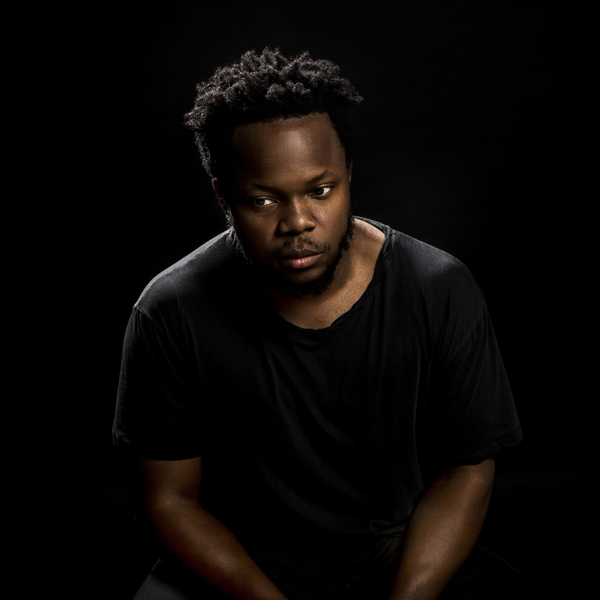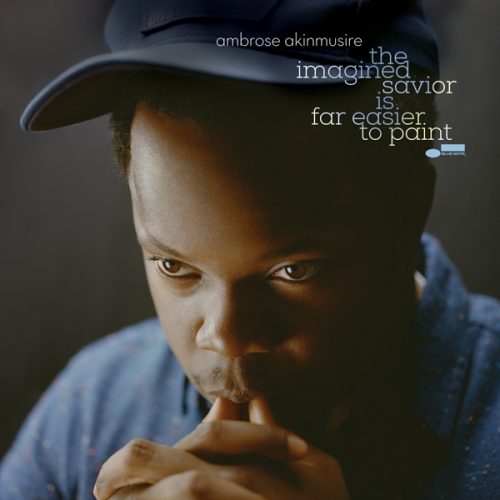March 13, 2014
Ambrose Akinmusire, “a thrilling young trumpeter and astute bandleader [with a] unique spark in his playing” (The New Yorker), brings his artistic vision to the next level with the imagined savior is far easier to paint, his second release for Blue Note Records. The album follows his acclaimed major label debut When the Heart Emerges Glistening, which New York Times critic Nate Chinen named his #1 album of 2011, Akinmusire takes a more compositional turn on the imagined savior is far easier to paint, writing 12 of the 13 tracks and producing the album himself.
While Akinmusire continues to feature his extraordinary working quintet with tenor saxophonist Walter Smith III, pianist Sam Harris, bassist Harish Raghavan, and drummer Justin Brown, he also broadens his palette by enlisting guitarist and fellow Northern California native Charles Altura. In addition, Akinmusire unveils gripping new collaborations with the OSSO String Quartet and flutist Elena Penderhughes, as well as vocalists Becca Stevens, Theo Bleckmann, and Cold Specks.
However, these encounters with strings and voices don’t at all diminish the central role of Akinmusire’s quintet, now edging toward a sextet with the addition of Altura. It’s awe-inspiring to hear the band’s energy and focus as it confronts every challenge in “As We Fight (willie penrose),” “Vartha,” “Bubbles (john william sublett)” (inspired by tap-dance legend John Bubbles), and “Richard (conduit),” a 16-minute-plus closing epic recorded live at Jazz Standard in New York City.
Also, while Akinmusire’s virtuoso trumpet is still very present on the imagined savior is far easier to paint, it coexists in a larger sonic framework than before. “Composition is what I’ve been focusing on the last few years,” the trumpeter says. “I want to be able to write a song and not have it need improvisation”
Reflecting on his penchant for long and poetic album titles, Akinmusire comments: “I don’t think I’ve been able to make an album yet where one word can capture the whole vibe. Maybe eventually I will. Right now I’m drawing from so many different parts of myself, and things that are outside of myself, that it’s hard to just have one word that says, ‘This means this.’”
Akinmusire continues: “The last album was about me — about things that I was experiencing and trying to change or accept about myself. The inspiration for this album is things outside of myself: people that I know, documentaries that I’ve watched, characters that I’ve made up.” Indeed, many song titles on the imagined savior is far easier to paint have a name attached in parentheses, and some of these reflect Akinmusire’s practice of creating elaborate storylines and fictional characters as an inspiration for his writing. Here he took this in a new direction, giving each of his guest vocalists a sketch of an idea and allowing them to create their own lyrics based on that idea.
The results are astonishing, beginning with Becca Stevens’ performance on her original “Our Basement (ed)”: centered by a pulsing heartbeat of a tempo, Stevens’ words and eerie unfolding harmonies mesh with Akinmusire’s quintet and the Osso String Quartet together in a complex and beautiful arrangement. The lyrical inspiration is “ed,” a homeless man on Akinmusire’s block who managed to save a couple hundred dollars to give back to the church that feeds him on weekends.
Theo Bleckmann, without question an innovator in vocal performance, met Akinmusire at the famed music workshop in Banff, Alberta. “We were on faculty and we played a Kate Bush song,” Akinmusire recalls. “After we played we looked at each other and I was like, ‘Ok, we have to work together.’” The resulting “asiam (joan),” featuring Bleckmann with the quintet, is inspired by Joni Mitchell — specifically, Michelle Mercer’s portrait of “Joan” in her 2009 book Will You Take Me As I Am: Joni Mitchell’s Blue Period.
“Ceaseless Inexhaustible Child (cyntoia brown)” — dedicated to the imprisoned young woman at the heart of the documentary The 16-Year-Old Killer — features the dramatic “doom soul” vocals of Cold Specks, the Canadian-born, London-based singer-songwriter. “I’m a huge fan of hers,” says Akinmusire. “In June I did this tribute to Joni up in Toronto. I wrote [Cold Specks] an email asking her to be on my album, and she wrote back saying she was just about to invite me to be on her album.”
Along with the vocal tracks, there are two additional pieces with string quartet and flute, “The Beauty of Dissolving Portraits” and “inflatedbyspinning.” The former stems from Akinmusire’s influences outside of jazz: “I’m really into people like Arvo Pärt, people whose compositions tend to evolve slowly. They’re adding and taking things away in a way that you don’t notice until a certain amount of time has gone by. It’s really hard with jazz instrumentation in a quintet format to get that sort of sustain.”
With “inflatedbyspinning,” Akinmusire captures a daydream: “I had an image of women standing on a cliff spinning. One was holding a red balloon, and at the start of the spinning the balloon wasn’t inflated, but when the spinning stopped, it was inflated.” Raghavan’s broad-toned arco bass supplements the strings and flute here.
In a loose parallel to “my name is OSCAR” (dedicated to the late Oscar Grant) on his previous album, Akinmusire offers “Rollcall for Those Absent” as an overt statement on “a certain reality that you can’t deny that goes on here in America and in the world: this fear of black men that causes a lot of sad stories.” The instrumentation here is wholly different from the rest of the album: Harris plays the melody on mellotron while Akinmusire plays chords and bass notes on Juno synth, and Muna Blake (the young daughter of drummer Johnathan Blake) reads aloud the names of numerous people killed by police — or by vigilante action, as in the prominent case of Trayvon Martin. “Having a young voice read the names, it’s like the beginning of life talking about the end of life,” Akinmusire says. “I wanted to capture that. In the same way, sounds that are really high and really low are like the beginning and the end.”
* * *
Born and raised in Oakland, California, Ambrose Akinmusire (pronounced ah-kin-MOO-sir-ee) was a member of the Berkeley High School Jazz Ensemble when he caught the attention of saxophonist Steve Coleman. Akinmusire was asked to join Coleman’s Five Elements, embarking on a European tour when he was just a 19-year-old student at the Manhattan School of Music. After returning to the West Coast to pursue a master’s degree at the University of Southern California, Akinmusire went on to attend the Thelonious Monk Institute of Jazz in Los Angeles, where he studied with Herbie Hancock, Wayne Shorter and Terence Blanchard.
In 2007 Akinmusire won the prestigious Thelonious Monk International Jazz Competition, decided by a panel of judges that included Blanchard, Quincy Jones, Herb Alpert, Hugh Masekela, Clark Terry and Roy Hargrove. That year Akinmusire also won the Carmine Caruso International Jazz Trumpet Solo Competition and released his debut album Prelude…To Cora on the Fresh Sound label. He moved back to New York and began performing with the likes of Vijay Iyer, Aaron Parks, Esperanza Spalding and Jason Moran. It was also during this time that he first caught the attention of another discerning listener, Bruce Lundvall, President of Blue Note Records.
Akinmusire’s Blue Note debut When The Heart Emerges Glistening was released in 2011 to rave reviews. The Los Angeles Times praised his “chameleonic tone that can sigh, flutter or soar,” adding that “Akinmusire sounds less like a rising star than one that was already at great heights and just waiting to be discovered.” DownBeat described his playing as “spectacular and not at all shy — muscular, driving, with a forward sound, pliant phrasing and a penchant for intervallic leaps,” concluding that “clearly something very special and personal is at work here, a vision of jazz that’s bigger than camps, broader and more intellectually restless than blowing sessions.”







